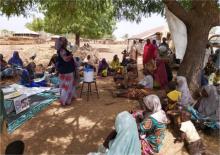WHO supports Government to curb gender-based violence
Abuja, 14 September, 2020 - World Health Organization (WHO) Nigeria has ramped up partnerships with the Nigerian government to improve awareness on the health challenges of violence against women and the importance of health sector response to Gender-Based Violence (GBV), particularly in the northeast, where thousands of conflict-displaced persons are receiving humanitarian aid.
In 2019, WHO assisted in creating awareness about the health consequences of GBV among 149 governments, development partners, Chief Security Officers and Internally Displaced Persons (IDP) what should be done to prevent and manage sexual violence in security compromised States of Adamawa and Borno.
WHO has also put in place, health sector plans for responding to GBV in Borno and Adamawa states as well as trained over 150 WHO hard-to-reach mobile team members to provide first line services mainstreamed into other essential services. To date, the teams have sensitized over 9 000 women and men on GBV and have provided first line GBV services to 29 people.
Struggling with mental health
GBV has serious short- and long-term consequences on women’s physical, sexual and reproductive and mental health as well as on their personal and social well-being. The health consequences of violence against women include injuries, untimed/unwanted pregnancy, sexually transmitted infections including HIV, pelvic pain, urinary tract infections, fistula, genital injuries, pregnancy complications, and chronic conditions. Mental health impacts for survivors of gender-based violence include Post Traumatic Stress Disorder (PTSD), depression, anxiety, substance misuse, self-harm and suicidal behavior, and sleep disturbances. In addition, a survivor of GBV may also face stigma and rejection from her community and family.
Narrating her story, 28-year-old Hauwa Ojeifo, a native of Edo state residing in FCT, Abuja said she was raped at the age of 21.
“This was someone I trusted so I never saw it coming. It happened in my home, in my bed and was done by someone I knew. I trusted him! I had invited him into my house and I was fully clothed in my hijab.”
For fear of discrimination and other consequences that might follow, Hauwa did not go to the hospital neither did she tell anyone close to her about the assault.
“I became distant with people and battled with long term stomach ache, anxiety and depression for three years. Following consultation with a doctor, questions arose and I was left with no choice but to finally tell my story and I was diagnosed with bipolar disorder and post-traumatic stress disorder (PTSD)”
“I struggled with maintaining interpersonal relationships and had low self-esteem. The irony is that no one knew I was going through all of this quietly. It’s either I did such a good job hiding it for years or people are just not as observant as they should be.”
Seeing that a lot of people are still not aware of gender-based violence, its mental and other health consequences and how it is affecting a lot of women in the country, Hauwa decided to be an advocate to assist other rape victims, give them support and provide a safe place for them to share their stories and seek help.
Government’s intervention
The results of a survey published by NOIPolls in July 2019 suggested that up to one in every three girls living in Nigeria could have experienced at least one form of sexual assault by the time they reach 25.
Preliminary reports from some countries have shown that COVID 19 have exacerbated risks of violence for women as distancing measures put in place encourage people to stay at home. The risk of intimate partner violence (IPV) is also likely to increase.
In Nigeria a series of high-profile cases of violence perpetrated against women during the four-month lockdown sparked nationwide protests by activists both online and at in-person rallies, this led to the Governors of Nigeria’s 36 states unanimously declaring a state of emergency on GBV in June 2020.
As part of their declaration, the governors also called on all states to immediately launch sex offender registries and push for tougher federal punishment for abuse and violence against women. There has been other high-level engagement with the legislature to put in place strong laws against Gender-based violence in Nigeria.
Earlier country in December 2019, while lunching the Sex Offenders Register as part of the government’s strategy to deal with the issue of rape, Mrs Pauline Tallen, Nigeria’s Minister for Women Affairs and Social Development claimed that about two million Nigerians (mainly women and girls) are raped every year.
However, efforts are lacking in the health sector which is often times, the first entry point for most survivors of Sexual violence. The need therefore exists for mainstreaming GBV services within the healthcare system and linking survivors to other services, stated Dr. Olumuyiwa Ojo WHO Nigeria National Professional Officer for Maternal, Sexual and Reproductive Health.
Bridging the gaps in GBV
Presently, WHO is collaborating with the Federal Ministry of Health to adapt the Clinical protocols on management of Intimate partner violence and sexual violence and also develop an action plan for health sector response to GBV. In the northeast, WHO continue to provide advocacy and sensitization of the communities and first line GBV services and referral.
Dr Ojo also added that “dire need for more funding to build capacity of health workers on how to adequately respond to survivors, ensure optimal referral to other services including legal and social/protection services remain the main challenges in GBV response. Health facilities need capacity to identify and provide information about GBV services available locally (e.g. hotlines, shelters, rape crisis centers, counselling) and treatment for survivors.” WHO has the capacity and tools to support government and partners to fill these gaps, if we get the support and resources.
Technical Contacts:
Dr Joy Ufere; Email: uferej [at] who.int; Tel: +234 803 979 5143
Dr Olumuyiwa Ojo; Email: ojool [at] who.int; Tel: +234 706 625 4989




